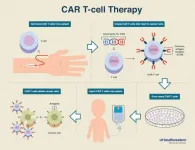Researchers said the findings, published in the International Journal of Environmental Research and Public Health, point to outdoor play and nature-based activities as a tool to help teenagers cope with major stressors like the COVID-19 pandemic, as well as future natural disasters and other global stressors. Researchers also underscore the mental health implications of restricting outdoor recreation opportunities for adolescents, and the need to increase access to the outdoors.
"Families should be encouraged that building patterns in outdoor recreation can give kids tools to weather the storms to come," said Kathryn Stevenson, a study co-author and assistant professor of parks, recreation and tourism management at NC State. "Things happen in life, and getting kids outside regularly is an easy way to build some mental resilience."
In the survey, conducted from April 30 to June 15, 2020, researchers asked 624 adolescents between the ages of 10 to 18 years to report their participation in outdoor recreation both before the pandemic and after social distancing measures were in effect across the United States. They also asked adolescents about their subjective well-being, a measure of happiness, and mental health.
The findings revealed the pandemic had an impact on the well-being of many teens in the survey, with nearly 52 percent of adolescents reporting declines in subjective well-being. They also saw declines in teens' ability to get outside, with 64 percent of adolescents reporting their outdoor activity participation fell during the early months of the pandemic. Despite these declines in outdoor activity participation, nearly 77 percent of teens surveyed believed that spending time outside helped them deal with stress associated with the COVID-19 pandemic.
"We know that a lot of outdoor activities that kids engage in happen during school, in youth sports leagues or clubs, and those things got put on hold during the pandemic," said the study's lead author Brent Jackson, a graduate student in the Fisheries, Wildlife and Conservation Biology Program at NC State. "Based on our study, they were getting outside less - we think not being in school and having those activities really contributed to that."
When they broke down recreation by type, they saw participation in outdoor play activities such as sports, biking, going for walks, runs or skating declined by 41.6 percent, nature-based activities such as camping, hiking, fishing, hunting, and paddling dropped by 39.7 percent, and outdoor family activities declined by 28.6 percent. In those early months of the pandemic, about 60 percent of teens said they were able to get outside once a week or less.
"We saw declines in all three types of outdoor recreation participation," Jackson said. "Nature-based activities had the lowest participation before and during the pandemic, which may point to the need for more access to natural spaces in general."
Results showed that well-being and outdoor recreation trends were linked, and the negative trends they saw during the pandemic for well-being and participation in outdoor recreation were seen regardless of teens' race, gender, age, income community type or geographic region. Kids who did not get outside as much saw declines in well-being, but those who got outside both before and during the pandemic were able to maintain higher levels of well-being.
"This tells us that outdoor recreation can promote well-being for kids when it happens, and can potentially take away from well-being when it doesn't," Stevenson said.
Teens who had high rates of outdoor play before the pandemic were more resistant to negative changes in social well-being. Those who got outside frequently before the pandemic were more likely to experience a lesser decline in well-being, regardless of participation during the pandemic. And, for teens who were able to play outside or get involved in nature-based activities during the pandemic, their well-being was on par with pre-pandemic levels.
"Kids who were able to continue participating in outdoor play and nature-based activities had subjective well-being levels that were similar to what they were before the pandemic, but kids who weren't able to participate saw much greater declines," Jackson said.
The study's findings also point to strategies to help kids navigate future global stressor events, as well as the importance of ensuring access to outdoor recreation. They help define the risks associated with policies that reduce kids' ability get outside.
"Going outside and participating in activities that provide exposure to nature, physical activity and safe social interaction during the pandemic were really powerful in terms of improving kids' resilience," Jackson said.
INFORMATION:
The study, "Outdoor Activity Participation Improves Adolescents' Mental Health and Well-Being During the COVID-19 Pandemic," was published open access March 3 in the International Journal of Environmental Research and Public Health. In addition to Jackson and Stevenson, other authors included Lincoln R. Larson, M. Nils Peterson and Erin Seekamp.
Note to editors: The abstract follows.
"Outdoor Activity Participation Improves Adolescents' Mental Health and Well-Being During the COVID-19 Pandemic"
Authors: S. Brent Jackson, Kathryn T. Stevenson, Lincoln R. Larson, M. Nils Peterson and Erin Seekamp.
DOI: 10.3390/ijerph18052506
Published online March 3 in the International Journal of Environmental Research and Public Health.
Abstract: COVID-19 is reshaping human interactions with the natural environment, potentially generating profound consequences for health and well-being. To assess the effects of COVID-19 on the outdoor recreation participation and subjective well-being of adolescents, as well as how participation in outdoor activities may mitigate declines in subjective well-being, we used a Qualtrics XM panel to conduct a nationally representative survey of youth ages 10-18 across the United States (n = 624) between 30 April and 15 June 2020. Survey questions focused on frequency of participation in outdoor activities before and during the pandemic, as well as changes in subjective well-being. Paired t-tests revealed decreases in both outdoor recreation participation (64% reported declines) and subjective well-being (52% reported declines). A regression model examining correlates of changes in subjective well-being (R2 = 0.42) revealed strong associations with changes in outdoor play (B = 0.44, p < 0.001) and nature-based (B = 0.21, p = 0.016) activities. Adolescents' from all backgrounds who participated in these activities during the pandemic reported smaller declines in subjective well-being. Results highlight the critical role that time outdoors and time in nature play in bolstering adolescents' resilience to stressors such as the COVID-19 pandemic and underscore the need to facilitate outdoor recreation opportunities for youth during times of crisis.


